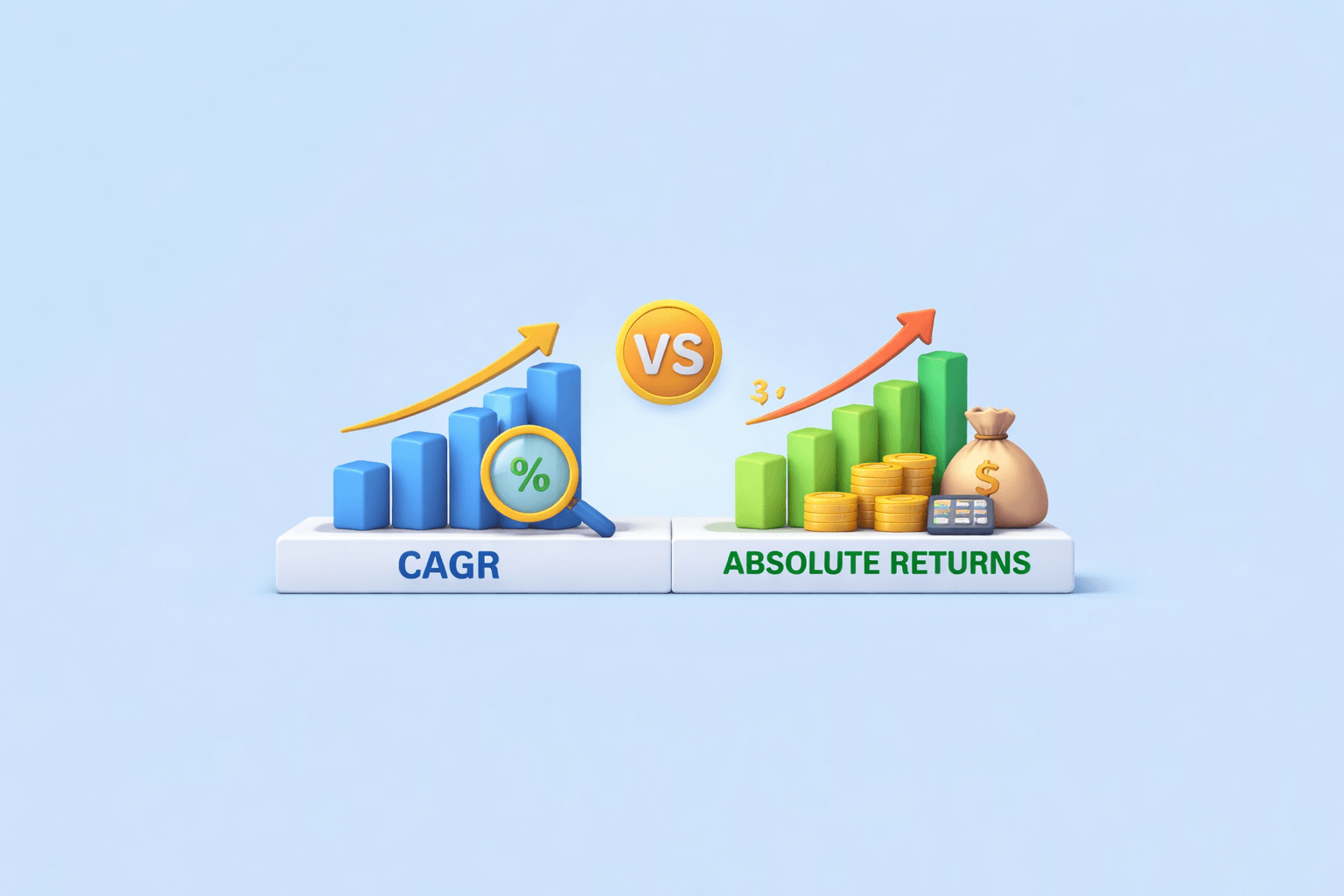- Home
- Blog
- Demat Account
- ESOP Taxation
- ESOP Taxation
ESOP Taxation

- Published Date: October 09, 2024
- Updated Date: June 17, 2025
- By Team Choice
Figuring out the financial world is often akin to working out a very intricate puzzle, which involves managing compensation and taxes. The farther up you go in your professional life, the more appealing Employee Stock Ownership Plans (ESOPs) start to get. Stock options provide a fascinating avenue for benefiting from company growth, a great combination of ambition and tangible reward.
However, with such avenues come serious tax implications, which must be considered in financial planning. ESOP taxation can be as complex as the options themselves. This blog covers how ESOPs are taxed in India, helping you maximise your benefits with minimum tax liabilities.
What are ESOPs?
In India, ESOPs are increasingly being considered part of compensation packages. They allow employees to have a share in the company they are employed with, and they better align with the company's success.
An ESOP is an employee benefit plan through which employees can buy the company's shares at a pre-decided price. Options are given as a part of the compensation package. As such, options will ensure that employees work for the company's growth and thereby share the fruits of its development in its true sense.
Key Features of ESOPs
- Vesting Period: The time the employee waits before exercising their option to take up stock. A company can issue ESOPs with a two-year vesting period, meaning the staff can exercise their options after two years.
- Exercise Period: This denotes the time when an employee is allowed to buy the shares from the pre-defined price. This typically takes place after the vesting period.
- Perquisites: The difference between the market value of shares at the time of exercise and the exercise price paid by the employee will be a perquisite in India. Hence, it forms a taxable benefit.
Some common terminologies applied to ESOP include:
- Grant Date: The date the company grants the ESOP to the employee.
- Exercise Price: The price at which the employee gets the right to buy the shares.
- Fair Market Value (FMV): The market value of the shares on the option's exercise date.
ESOP Taxation in India
The taxation process for ESOPs involves multiple stages, including the moment you exercise your options and when you eventually sell the shares. Each stage has specific tax implications that can impact your overall financial outcome.
Taxation Upon Exercise
The difference between the FMV of shares on the date of exercise and the exercise price of the shares on the date of exercise is regarded as a perquisite. This perquisite is taxable as salary income under the Income Tax Act 1961.
The formula for calculating Perquisite Value:
Perquisite Value=(FMV on Exercise Date−Exercise Price)×Number of Shares Exercised
For example, if an employee exercises 100 shares at an exercise price of ₹1,000 each, and the FMV on the exercise date is ₹1,500, the perquisite value is ₹50,000 [(₹1,500 - ₹1,000) × 100].
Taxation at the Time of Sale
The government levies a capital gains tax when the employee finally sells those shares. The gain would be regarded as long-term or short-term, depending upon the period of holding:
- Short-term capital gain (STCG): If the shares are sold within 24 months of exercise, the gains are considered short-term and attract the applicable income tax slab rates.
- Long-term capital gain (LTCG): It is considered if the shares are held for more than 24 months. The LTCG exceeding ₹1 lakh attracted a flat rate of tax 10% without considering the indexation benefit.
Also Read: Difference Between Short Term and Long Term Gain
Let’s say an employee exercised 150 shares at an exercise price of ₹2,000 each when the FMV was ₹2,500. The perquisite value would be ₹75,000. Later, the employee sells the shares after holding them for 30 months at a sale price of ₹3,500 per share. The LTCG would be calculated as follows:
Capital Gain=(Sale Price−FMV on Exercise Date)×Number of Shares
Capital Gain=(₹3,500−₹2,500)×150=₹150,000
The taxable LTCG, after the ₹1 lakh exemption, would be ₹50,000, and the tax payable would be ₹5,000 (10% of ₹50,000).
Understanding Stages of Taxation With an Example
First Level of Taxation (When the Option is Exercised):
On March 15, 2022, Mr Y exercised his option to purchase 8,000 shares of XYZ Ltd. at an exercise price of INR 70 per share. The FMV of the shares on the exercise date was INR 110 per share. The perquisite value would be calculated as follows:
Perquisite Value=(FMV per share−Exercise price per share)×Number of shares allotted
Perquisite Value=(INR110−INR70)×8,000=INR320,000
So, INR 320,000 would be added to Mr Y's taxable income as a perquisite in the financial year 2021-22.
Second Level of Taxation (When the Shares are Sold):
On November 20, 2022, Mr Y sold the shares at INR 140 per share. The capital gain on the sale of shares would be calculated as follows:
Capital Gain Calculation:
Capital Gain=Sale price per share−FMV per share on the date of exercise
Capital Gain=INR140−INR110=INR30 per share
Since the shares were held for more than 12 months, the capital gain would be treated as a long-term capital gain. If the total capital gains on the sale of shares in the financial year 2022-23 exceed INR 1 lakh, Mr Y would have to pay the LTCG tax at the rate of 10% on the amount exceeding INR 1 lakh.
More ESOP Taxation Considerations
Here are a few things to remember regarding tax calculation on the sale of ESOPs.
Sell-to-Cover Transactions
When the shares are exercised on vesting, the employer must make a deduction for Tax Deducted at Source (TDS) under Section 192 on the FMV of the exercised option. The FMV is considered a perquisite and taxable under the "Income from Salary." Since this is non-cash compensation, employers can ask you for payment for TDS via bank transfer, or they will probably automatically initiate a sell-to-cover transaction upon vesting. This would involve selling some allotted shares to cover the tax liability.
Example:
RSUstocks vested: 100
Market Value (per share) at vesting: ₹4,500
Total Gain (taxable income): 100 * ₹4,500 = ₹4,50,000
Tax Withholding Requirement (cess included): ₹4,50,000 * 31.2% = ₹1,40,400
Average Sale Price (per share) for Sell-to-Cover: ₹4,200
Shares Sold to Cover Withholding: ₹1,40,400 / ₹4,200 = 33 shares
Cash Value of Shares Sold for Withholding: 33 * ₹4,200 = ₹1,38,600
Net Shares Deposited to Demat: 100 - 33 = 67 shares
Since shares are sold in this transaction, it may result in notional capital gains or losses, which must be reported in your income tax return. Employees need to pay attention when subsequently selling these shares, as capital gains taxes will apply.
Capital Gains/Losses
The capital gain tax rates depend on the duration of holding of the shares after exercise. Regarding equity shares traded on a recognised stock exchange, where Securities Transaction Tax (STT) is paid on the sale, holding for more than one year makes their long-term gains.
Gains will be taxed at 10% without indexation for amounts exceeding ₹1 lakh. Gains would be considered short-term if the shares are sold within one year, and the resultant tax rate shall be 15%. As of July 23, 2024, LTCG on listed equity shares is taxed at 12.5% for gains over ₹1.25 lakh.
A loss from such short-term capital can be carried forward against gains.
Listed Vs. Unlisted Shares
The taxation of listed and unlisted shares is different. Unlisted shares in India or abroad attract different holding periods for classification under tax laws. Unlisted shares will be long-term if held for more than 24 months. The holding period shall start from the exercise date and end on the sale date. The short-term gain is taxed at slab rates; the long-term gain is taxed at 20%, along with indexation.
Summary of Tax Implications:
| Particulars | Up to July 23, 2024 | Effective July 23, 2024 |
|---|---|---|
| Indian Listed Company | 1 Year (STCG: 15%, LTCG: 10%) | 1 Year (STCG: 20%, LTCG: 12.5%) |
| Indian Unlisted Company | 2 Years (STCG: Slab Rates, LTCG: 20%) | 2 Years (STCG: Slab Rates, LTCG: 12.5%) |
| Foreign Listed Company | 2 Years (STCG: Slab Rates, LTCG: 20%) | 2 Years (STCG: Slab Rates, LTCG: 12.5%) |
| Foreign Unlisted Company | 2 Years (STCG: Slab Rates, LTCG: 20%) | 2 Years (STCG: Slab Rates, LTCG: 12.5%) |
Buyback of Stock Options
In unlisted Indian companies or startups, promoters buy back their options before they convert them into equity shares. Such buyback aims to provide liquidity to employees when shares are not readily marketable. Income from buyback is considered as salary and attracts TDS under Section 192. It will form a part of your Form 16 and does not require disclosure separately in your income tax return.
Residential Status
Your residential status in India will determine your tax liability in the country. While residents are taxed on worldwide income, non-residents or RNORs are taxed only on income accrued in India. Residential status is the primary determinant of the taxability of ESOPs.
Residents holding ESOPs or Restricted Stock Units ( RSU)s of foreign companies shall declare such holdings in their income tax return. This is mainly for transparency and information on foreign assets.
Unexercised Options
The employee is not under any obligation to exercise the vesting options. In the event of non-exercise, there is no tax liability.
Compliance and Reporting Requirements
Proper compliance and accurate reporting are crucial when it comes to the taxation of ESOPs. Both employees and employers must meet the reporting requirements:
- The employees must return the value of the perquisites arising from the ESOP exercise while filing annual income tax returns. At the time of sale, they also have to compute and disclose the capital gains, short-term or long-term, on the holding period.
- Employers are obligated to deduct applicable tax, such as the TDS, on the value of the perquisite added by the exercise of ESOPs by its employees. Employers are also supposed to make detailed disclosures in the financial statements regarding the grant of ESOP, the vested portion, and the portion that has been exercised so that there will be consistency in presentation according to regulatory requirements.
How to Reduce ESOP Tax?
Understanding taxation strategies in ESOPs may be just what makes the difference in your financial outcome. It may enable the employees to minimise their tax liabilities and make gains in tax deferral with options being exercised correctly on time, holding shares for the right amount of time, and looking for opportunities for tax deferrals.
- Exercise Time: It is clear that the timing of exercising ESOPs when the FMV is relatively low can help reduce the perquisite value and, hence, the tax liability. The employees will thus have to be very judicious about the market conditions and growth prospects of the firms to determine the exact timing for exercising their options.
- Holding Period Considerations: Holding the shares for more than twenty-four months after the date of exercise entitles employees to the lower capital gains tax applied to long-term investments. A good plan if the share price is expected to rise in the longer term.
- Tax Deferral Options - While currently, India taxes ESOPs at the time of exercise, others exempt such incomes until the point of share sell-off. Employees working in multinational companies in India are entitled to defer tax liability settlement depending on their company's global policy.
Proposed ESOP Taxation Relief in Budget 2024
The Government of India is considering a significant change in how it taxes ESOPs when Budget 2024 rolls around. Currently, employees are taxed when exercising the option, which can result in a huge tax burden on the staff before they make any financial gain on the stock sale. The new proposal intends to push the incidence of tax at the time of selling, aligning the sale and realisation time of income.
This would benefit employees by easing the cash flow problems related to ESOPs. This has been the long-stated argument by industry majors concerning such a move that making ESOPs more feasible and appealing to employees, especially in startups, would foster innovation and entrepreneurship.
While this is just a proposal and hence still under consideration, if it sees the light of day, this would bring India closer to global practices since most nations end up taxing at the point of sale. It can also encourage more companies to give their employees ESOPs to improve employee ownership and long-term wealth creation.
Conclusion
Understanding the taxation inside out is an elemental duty regarding effective ESOP management. You'll maximise your stock options by understanding how taxation occurs at exercise and sale and mitigating strategies that reduce the liabilities. The understanding is meant to help prepare and enhance the overall financial status, ensuring the ESOPs positively affect your general economic health.
Want to make the best out of ESOP available to you? Get expert advice and guidance from Choice.
Recommended for you

CAGR Vs Absolute Returns in Mutual Funds: Key Differences You Should Know

How To Sell Mutual Funds In India: Everything You Need To Know

What is Dabba Trading: Meaning, Risks, and Reality Explained
